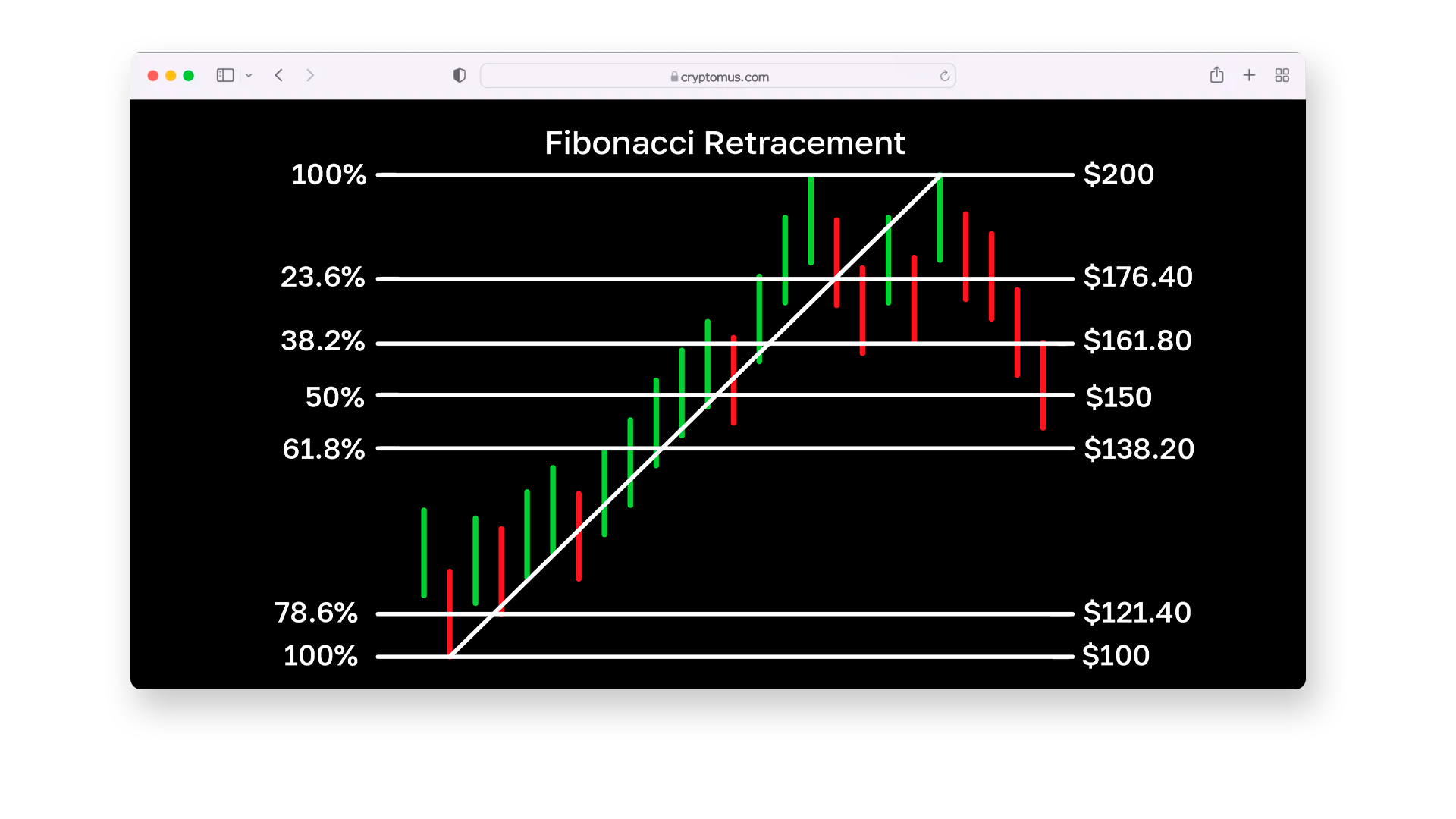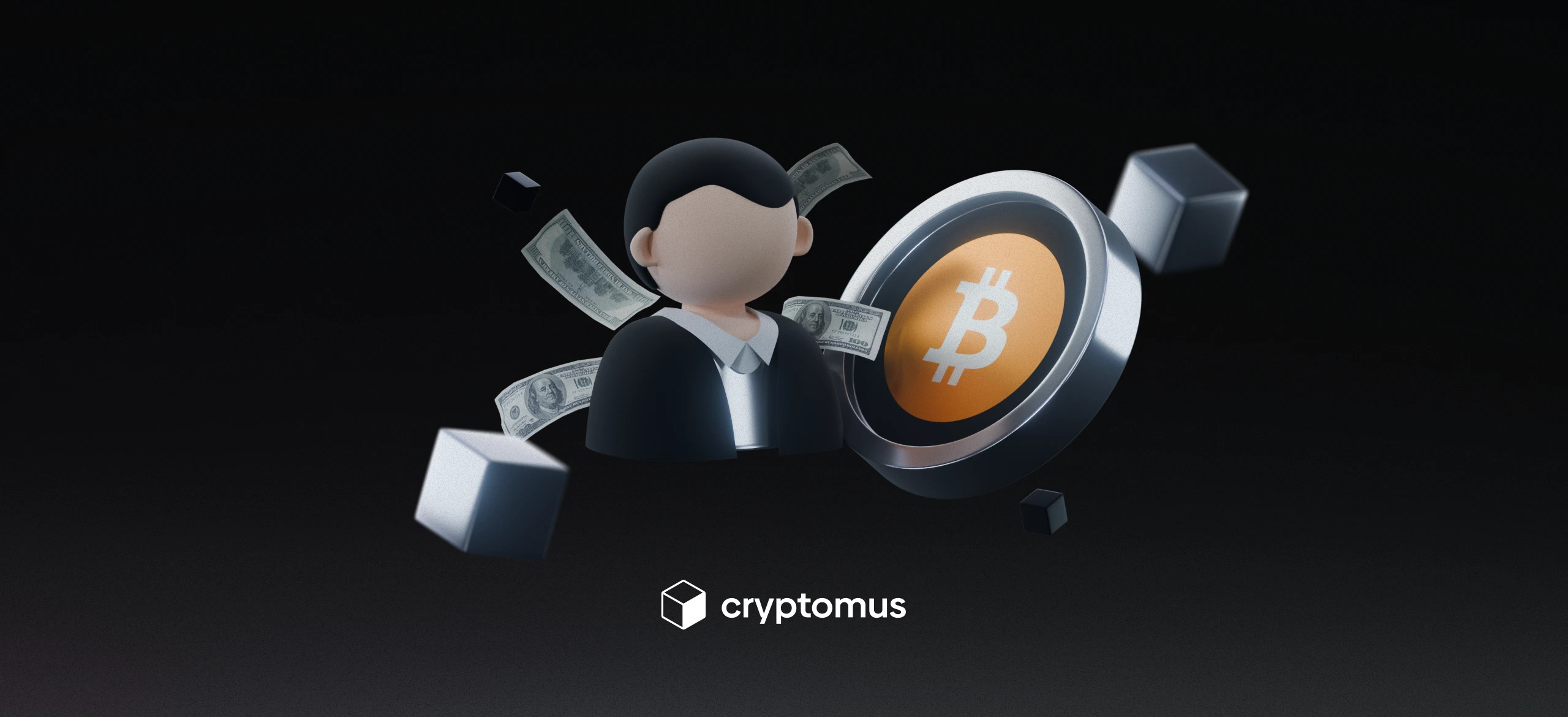
การถอนฟีโบนักชีในการเข้ารหัสลับคืออะไรและวิธีใช้งาน
สารบัญ
การเทรดคริปโตไม่ใช่แค่การวิเคราะห์ แต่ยังรวมถึงการคาดการณ์ทิศทางตลาดด้วย นี่คือจุดที่ Fibonacci retracement เข้ามามีบทบาท—เป็นเครื่องมือที่ช่วยระบุแนวรับ/แนวต้านที่ซ่อนอยู่และแปลงให้กลายเป็นจุดตัดสินใจสำคัญในการเทรด น่าสนใจใช่ไหม? มาค้นหาไปพร้อมกันในบทความนี้ว่าจะใช้ Fibonacci retracement ให้ถูกต้องเพื่อเพิ่มความแม่นยำในการตัดสินใจและโอกาสทำกำไรได้อย่างไร
Fibonacci Retracement คืออะไร?
Fibonacci retracement เป็น indicator ยอดนิยมในการวิเคราะห์ทางเทคนิคที่ช่วยเทรดเดอร์ระบุจุดที่ราคา “อาจ” กลับตัวของสินทรัพย์ โดยอิงมาจากลำดับตัวเลข Fibonacci เครื่องมือนี้ใช้ “ระดับราคา” สำคัญเพื่อคาดการณ์ว่าการย่อราคา (correction) อาจเกิดขึ้นตรงไหนระหว่างแนวโน้มเดิมที่กำลังดำเนินอยู่
ระดับเหล่านี้มีความสำคัญเพราะมักทำหน้าที่เป็นโซนที่ราคาจะ “หยุดพัก กลับทิศ หรือแกว่งตัวสะสม (consolidate)” ก่อนเดินหน้าตามแนวโน้มเดิม เมื่อวางระดับ Fibonacci retracement ลงบนกราฟ เทรดเดอร์จะเห็นโซนแนวรับ/แนวต้านที่เป็นไปได้ ช่วยให้ตัดสินใจเทรดได้รอบคอบยิ่งขึ้น

ระดับ Fibonacci
ระดับหลักที่นิยมใช้ในการเทรดคริปโตคือ 23.6%, 38.2%, 50%, 61.8%, 78.6% ซึ่งแทน “สัดส่วนการย่อ” ของระยะการเคลื่อนที่ทั้งหมด ก่อนที่แนวโน้มเดิมจะดำเนินต่อไป
สรุปความหมายแต่ละระดับ:
- 23.6%: การย่อระดับตื้น มักบอกถึงการพักสั้นๆ ก่อนไปต่อ
- 38.2%: การย่อที่ลึกขึ้น ราคาอาจหยุด/ดีด หรือกลับทิศก่อนเดินหน้าตามแนวโน้มเดิม
- 50%: ไม่ใช่ระดับจากลำดับ Fibonacci โดยตรง แต่ใช้กันแพร่หลายเพราะเป็น “กึ่งกลาง” ของระยะการขึ้น/ลง มักเป็นโซนจิตวิทยาสำคัญ
- 61.8%: “อัตราส่วนทองคำ (golden ratio)” เป็นหนึ่งในระดับที่ทรงพลัง มักทำหน้าที่เป็นแนวรับ/แนวต้านแข็งแรง
- 78.6%: การย่อค่อนข้างลึก บอกถึงการปรับฐานแรง ซึ่งอาจนำไปสู่การกลับตัวหรือไปต่อได้เช่นกัน
เทรดเดอร์ใช้ระดับเหล่านี้เพื่อประเมินว่าราคา “น่าจะ” ย่อถึงไหนก่อนกลับไปตามแนวโน้มเดิม
Fibonacci Retracement ทำงานอย่างไร?
หลักการคือการหา “swing high” และ “swing low” ของช่วงการเคลื่อนที่ จากนั้นวางระดับ Fibonacci ระหว่างสองจุดนั้นเพื่อเน้นโซนที่ราคามีแนวโน้มจะย่อกลับ ก่อนไปต่อในทิศทางเดิม วิธีคิดคือวัด “ระยะตั้งฉาก” ระหว่าง swing high กับ swing low แล้วนำเปอร์เซ็นต์ Fibonacci มาคำนวณ
ตัวอย่าง: ถ้าราคาขึ้นจาก $100 → $200 ระดับ Fibonacci จะเป็น:
- 23.6%: $200 - (100 × 0.236) = $176.40
- 38.2%: $200 - (100 × 0.382) = $161.80
- 50%: $200 - (100 × 0.50) = $150
- 61.8%: $200 - (100 × 0.618) = $138.20
- 78.6%: $200 - (100 × 0.786) = $121.40
นำระดับเหล่านี้ไปวางบนกราฟ แล้วเฝ้าดูปฏิกิริยาราคาเมื่อแตะระดับต่างๆ ว่าจะ “เด้ง/ สะสม/ ทะลุ” อย่างไร

อ่านกราฟ Fibonacci อย่างไร?
การอ่าน กราฟ แบบ Fibonacci คือการตีความ “ปฏิกิริยาราคา” เมื่อแตะระดับที่วางไว้ แนวทางคือ:
สังเกตพฤติกรรมราคาที่ระดับ Fibonacci
เมื่อราคามาถึงระดับหนึ่ง ให้ดูว่าเกิดอะไรขึ้น:
- ดีดตัว (bounce): ถ้าดีดแล้วไปต่อทิศทางเดิม มีโอกาสว่าแนวโน้มจะยังดำเนินต่อ
- แกว่งสะสม (consolidation): ถ้าราคาแกว่งแคบๆ อาจเป็นการพักก่อนไปต่อ
- ทะลุระดับ (breakthrough): ถ้าทะลุชัด อาจสื่อถึงการกลับทิศหรือการย่อลึกขึ้น
เช่น หากราคาย่อลงมา 38.2% แล้วเริ่มเด้ง มีนัยว่าแนวโน้มเดิมอาจไปต่อ แต่ถ้า “หลุด” 61.8% อาจบอกถึงการกลับตัว
ยืนยันด้วยเครื่องมืออื่น (confluence)
ใช้ตัวช่วยทางเทคนิคเพิ่มเติมเพื่อยืนยันสัญญาณ:
- Candlestick patterns: มองหารูปแบบกลับตัวใกล้ระดับ Fibonacci
- Moving averages: ช่วยระบุภาพรวมแนวโน้ม
- Volume: ปริมาณซื้อขายสูงที่ระดับ Fibonacci มักเสริมความแข็งแรงของแนวรับ/แนวต้าน
การดู price action แล้ว “ผสาน” กับเครื่องมืออื่น ช่วยกำหนดจุดเข้า/ออกได้แม่นยำขึ้น
Bitcoin & Fibonacci
ระดับ Fibonacci นิยมใช้กับการเทรด Bitcoin เพื่อหาแนวรับ/แนวต้าน เพราะ BTC มีความผันผวนสูง ตัวอย่างเช่น หากราคาขึ้นจาก $90,000 → $100,000 สามารถวางระดับสำคัญอย่าง 23.6%, 38.2%, 50%, 61.8% เพื่อประเมินการย่อ ราคาอ้างอิงในตัวอย่างคือ:
- 23.6%: $96,760
- 38.2%: $94,180
- 50%: $90,000
- 61.8%: $85,820
ระดับเหล่านี้คือโซนที่ราคามีโอกาสย่อก่อนกลับไปตามแนวโน้มเดิม เทรดเดอร์จึงจับตาปฏิกิริยาของ BTC ณ จุดเหล่านี้อย่างใกล้ชิด การ “เด้ง” บนระดับสำคัญอาจบอกถึงการไปต่อของขาขึ้น ขณะที่การ “หลุด” 50% หรือ 61.8% อาจสื่อถึงการย่อที่ลึกขึ้นหรือการกลับทิศ
สรุปแล้ว Fibonacci retracement เป็นเครื่องมือที่มีคุณค่าสำหรับเทรดเดอร์คริปโต ช่วยมองเห็นโซนที่ราคาอาจ “ย่อหรือกลับตัว” เพื่อการตัดสินใจที่มีข้อมูลรองรับ แม้เครื่องมือนี้ไม่ได้สมบูรณ์แบบ แต่เมื่อใช้ร่วมกับ indicator อื่นๆ ก็ช่วยยกระดับการรับมือความผันผวนและเพิ่มโอกาสทำกำไรได้อย่างมีนัยสำคัญ ขอบคุณที่อ่านจนจบ!
ทำให้การเดินทางสู่ Crypto ของคุณง่ายขึ้น
อยากเก็บ ส่ง รับ เดิมพัน หรือซื้อขายคริปโทเคอร์เรนซีใช่ไหม? Cryptomus ทำได้ทุกอย่าง — สมัครและจัดการกองทุนคริปโทเคอร์เรนซีของคุณด้วยเครื่องมืออันแสนสะดวกของเรา
เริ่มต้นใช้งาน



